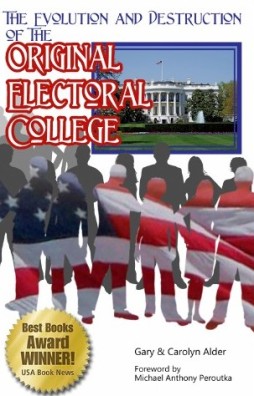A Paraphrase of Federalist No. 39


The Constitution Conforms
to Republican Principles
Federalist 39 by James Madison
Paraphrase by Gary Alder
Probably the most effective way to become acquainted with the thinking of an individual like James Madison, is to study one of his essays and then paraphrase the concepts that he expresses in your own words. This work represents that very endeavor with James Madison’s essay touching the republican nature of government and the the new federalism as described in the constitution. I invite all patriots and students of the Constitution to review my efforts contained in this study and express your views whether similar or contrary to what I claim James Madison was trying to say.
–Gary Alder
This article is designed for online viewing and study. It contains popup footnotes for each paragraph that display the original text.
For a download of the PDF version of this article go to the FreedomFormula store page and make a donation in any amount.
FreedomFormula.us ==>
Introduction
Federalist 39 was written for the Independent Journal, a New York newspaper, on January 16, 1788 by James Madison. In this essay Madison starts by defining and describing a republican government. He then demonstrates that the government established by the proposed Constitution was in every respect republican in nature. After establishing this point, Madison answers the charges of the critics of the Constitution proving that the Constitution did not intend to establish what its opponents called a consolidated government. Even though the Constitution applied some national features it retained plenty of federal features to protect against consolidation.
Part of the confusion came about because even though the Constitution established a government that was less strictly federal than under the Articles of Confederation, the supporters of the Constitution appropriated the name federalists to describe themselves. To put this in perspective, it means that the Anti-federalists (opponents of the new Constitution) were more federalist in nature than the Federalists (proponents of the Constitution) Our modern understanding is also clouded by our common use of the term federal to mean the current government in Washington, D.C. which has become extremely nationalistic and consolidated in nature.
This work is structured to contain a paragraph by paragraph description of the points that Madison makes. Footnotes to the actual text as contained in the five volume series, The Founders’ Constitution are provided for review and additional study.
Republican Government
We must first determine whether or not the government is strictly republican. Obviously no other form of government would be acceptable to the thinking of the people of America; agreeable with the fundamental principles of the revolution; or in line with the passion that excites every patriot devoted to freedom, to build our political system on the ability of mankind for self-government. If the Constitution designed by the Convention does not maintain its republican character, it cannot be defended and must be abandoned.
What are the characteristics of a republican government? If we try to answer this question by relying on the way political writers use this term referring to the governments of other countries, rather than looking at principles, we will never find a satisfactory answer. Holland, where no part of the authority is derived from the people, is almost always referred to as a republic. Venice, where a small body of hereditary nobles exercises total power over the masses, is called by the same name. Poland has a mixture of the worst forms of aristocracy and monarchy. It is also denominated a republic. The government of England has only one republican branch, along with other branches consisting of a hereditary aristocracy and a monarchy. It has also been improperly placed on the list of republics. These examples, which are nearly as different from each other as they are unlike a true republic, demonstrate how inaccurately the term has been used in analytical discussions.
If we judge by the various principles on which different forms of government are based, we may define a republic to be: a government which derives all its powers directly or indirectly from the great body of the people. Those in office remain until the people desire a change, or for a limited term, or can be removed for malfeasance. It is essential that a republican government be derived from the mass of the people rather than only a small minority or a privileged class. Otherwise any small group of tyrannical nobles by delegating their powers could say their government was a republic. To qualify as a republic the individuals administering it must be appointed, either directly or indirectly, by the people and they must hold their offices by pleasure of the people, limited term or good behavior as previously described. Any government in the United States or any other country that does not conform to this can not legitimately be called a republic. According to the Constitution of every State in the Union, some of the officers of government are only appointed indirectly by the people. In most cases this is how the Governor is appointed. In one state, one branch of the legislature is indirectly chosen. According to all of the state constitutions the highest offices are held for a term of years both within the legislative and executive branches. Most of the state constitutions specify that the judges are to hold their offices during good behavior.
Upon examination, it becomes obvious that the Constitution as designed by the Convention conforms totally to the standard described here. The House of Representatives is elected directly by the people, as is at least one branch of all state legislatures. The Senate, like the Congress under the Articles of Confederation and the Senate of Maryland is appointed indirectly by the people. The President is appointed indirectly as is the chief executive of most states. Even the judges, along with all other officers of the Union, will be indirectly chosen by the people. The duration of appointments is according to the republican standard, and similar to the pattern set forth in the state constitutions. The House of Representatives is elected for a certain period as is the case in all of the states. The term for the House is two years as it is in South Carolina. The Senate is elected for six years. This is only one year more than the senate of Maryland and only two years more than the senates of New York and Virginia. The President is to be in office for a term of four years. In New York and Delaware the chief magistrate is elected for three years, and in South Carolina for two years. In the other states the chief magistrate is elected annually. In several of the states there is no provision to impeach the chief magistrate. In Delaware and Virginia, he is not impeachable until after he leaves office. The President of the United States is impeachable at any time during his continuance in office. Judges hold their office during good behavior. That is the way it should be. The term of office of ministerial offices will generally be set by legal regulation guided by reason and the example of the state constitutions.
The provision that prohibits titles of nobility in both the federal and state governments and the guarantee of a republican form of government to each of the states prove that the system is republican.
Federal or National
But those opposed to the proposed Constitution say that it was not enough for the form of government to be republican. They claim that the original federal form of government which regards the union as only a confederacy of sovereign states needed to be preserved. They claim that the Convention framed a national government which is a total consolidation of the states. They then ask by what authority this bold and radical change was undertaken. Their exploitation of this argument requires a precise examination and response.
Without investigating the accuracy of the argument on which the objection is founded, we will first determine the real character of the new government proposed. Next we will see if the Convention was authorized to propose such a government. Lastly we must determine if the duty they had to suggest improvements to the form of government justified going beyond their specific instructions.
In order to determine the real character of the proposed government we will consider the foundation on which it is to be established; the sources of its powers; the operation of those powers; the extent of those powers; and the authority to make future changes.
Foundation – Federal
The Constitution is to be founded on the assent and ratification of the people of America. This assent is to be given by delegates elected for this specific purpose. The ratification is not to be done by the people of the whole nation considered as one body but by the people in each state considered as separate independent entities. It is to be the assent and ratification of the several States, derived from the supreme authority in each State, the authority of the people themselves. The act therefore establishing the Constitution will not be a national but a federal act.
The ratification by the people separately from so many independent states will be a federal and not a national act. It is obvious from this single consideration that it is to result neither from the decision of a majority of the people of the Union, nor from that of a majority of the states. It must result from the unanimous assent of the states that are parties to it. This is no different than their ordinary assent to matters of their states other than it is being expressed, not by the legislative authority, but by the authority of the people themselves. If the people were regarded in this transaction as forming one nation, the will of the majority of the whole people of the United States, would bind the minority; in the same manner as the majority in each state must bind the minority. The will of the majority would have to be determined either by counting the individual votes nationwide or by considering the will of a majority of the states, as evidence of the will of a majority of the people of the United States. Neither of these rules has been adopted. Each state in ratifying the Constitution is considered as a sovereign body independent of all others, and only to be bound by its own voluntary act. In this regard the new Constitution will be a federal and not a national Constitution.
Source of Power – Federal and National
Let us next discuss the sources from which the ordinary powers of government are to be derived. The House of Representatives will derive its powers from the people of America. The people will be represented in the same proportion, and on the same principle, as they are in the legislature of a particular state. In this respect the government is national not federal. The Senate on the other hand will derive its powers from the states, as political and co-equal societies; and these will be represented on the principle of equality in the Senate, as they now are in the existing Congress. In this respect the government is federal, not national. The executive power will be derived from a very compound source. The nomination of the presidential candidates is to be made by the states in their political characters. The electoral votes allotted to the states, are in a compound ratio, which considers them partly as distinct and co-equal societies; partly as unequal members of the same society. The final election of the President is to be made by that branch of Congress which consists of the national representatives. In this election however, they are to be considered individual delegations from so many distinct and co-equal political bodies. From this view of the government, it appears to be of a mixed character possessing at least as many federal features as national features.
Operation of Powers – National
The difference between a federal and a national government in its operation is: In a federal government, the powers operate on the political bodies composing the confederacy [in our case, the states]. In a national government, the powers operate on the citizens of the nation, as individuals. In this respect, the Constitution is national, not federal; though perhaps not as completely, as has been presumed. In cases to which states are parties, they must be considered and action taken against them in their collective and political capacities as states. In this respect the national nature of the government seems to be distorted by a few federal features. But this is perhaps unavoidable in any plan; and the ordinary operation of the government is on the people as individuals. In this regard it may be considered a national government.
Extent of Powers – Federal
But even though the government is national with regard to the operation of its powers, its nature changes again when we look at the extent of its powers. The concept of a national government involves, not only authority over individual citizens; but total supremacy over all entities, subject to lawful government. Among a people consolidated into one nation, this supremacy is completely vested in the national legislature. Among communities united for particular purposes, it is vested partly in the general, and partly in the local legislatures. In a national structure, all local authorities are subordinate to the supreme; and may be controlled, directed or abolished by it as it desires. In a federal structure, the local or municipal authorities form distinct and independent portions of the supremacy [shared sovereignty]. They are no more subject within their respective spheres to the general authority [national level], than the general authority is subject to them, within its own sphere. In this regard the proposed government cannot be deemed a national one; since its jurisdiction is limited to certain enumerated objects only. Sovereignty over all other objects is left totally to the states. It is true that in controversies relating to the distinction between the two jurisdictions, the tribunal which ultimately will decide is to be established under the general government. But this does not change the principle. The decision is to be made impartially, according to the rules of the Constitution; and many carefully defined precautions are taken to secure this impartiality. In order to prevent an appeal to the sword, and the dissolution of the compact, some such tribunal is clearly essential. It is safe to say that the tribunal ought to be established under the general, rather than under the local governments.
Future Changes – Federal and National
If we consider the authority by which amendments are to be made to the Constitution, we will find that it is neither wholly national, nor wholly federal. If it were wholly national, the supreme and ultimate authority would reside in the majority of the people of the Union without restriction; like that of a majority of every national society, to alter or abolish its established government. If it were it wholly federal on the other hand, the concurrence of each state in the Union would be essential to every alteration that would be binding on all. The method established by the plan of the Convention is not founded exclusively on either of these principles. By requiring more than a majority, and specifically, in determining the proportion by states, not by citizens, it moves from the national, toward the federal nature: In requiring the concurrence of less than the whole number of states, it loses again the federal nature, and takes on the national nature.
Madison’s Conclusion
The proposed Constitution therefore is in strictness neither a national nor a federal constitution; but a composition of both. In its foundation, it is federal, not national; in the sources from which the ordinary powers of the Government are drawn, it is partly federal, and partly national: in the operation of these powers, it is national, not federal: In the extent of them again, it is federal, not national: And finally, in the authoritative mode of introducing amendments, it is neither wholly federal, nor wholly national.



Under the Lincoln-theory of government, the US government is wholly national, since federal limitations on government are purely nominal and powerless. As Lincoln put it, “has any plainly written right in the constitution been denied? I think not.”
And the Union Army bulldozed over the minority state who thought SO.
The phrase “partly national” is thus an oxymoron, when the states are not individual sovereign nations; for then the “federal” government wields NATIONAL authority.
And it is for this reason, that Madison included the assurance to the states, that each ratifying state was “a sovereign body, separate from all others, and to bound only by its own voluntary act.”
And Madison maintained this after the Constitution, throughout the Virginia Resolutions.
Love your website – intend to pursue it some more. Don’t know why I have not run into you before now!!!
In liberty,
Dianne Gilbert / NHCCS